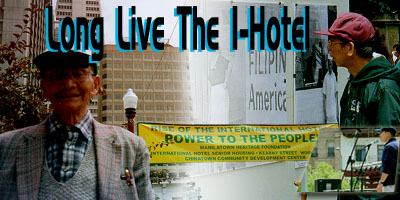|
by Mike Vizcarra/PNN Media Intern
The street was quiet. Too quiet. And empty. Almost like one
of those western movies where there’s no one on the streets and a tumbleweed
goes by. It was a bright day and sunny day and I was thinking maybe I should
have put sunscreen on. But I’m Filipino. I don’t burn. I also had another
strange thought as I walked up Washington Street towards Kearny, “It seems
abnormally quiet around here. What if no one is at Portsmouth Square? What
if no one came to support?” But my worries subsided when I reached the
square and saw volunteers helping set up the stage of Manilatown’s 25th Year
Eviction Commemoration of the International Hotel.
It was exactly 25 years ago to the day when San Francisco police
evicted over 50 elderly Filipino and Chinese tenants from the International
Hotel (I-Hotel). The International Hotel had been the home to many
immigrants dating back to 1910. Starting in the 1920s, there was an influx
of Filipino immigrants to the United States. They helped to fill the need
for labor created by the exclusion of the Chinese, Japanese, Koreans, and
Asian Indians. But they still could not own land or property and thus had
to stay in rooming houses or hotels. Thus, the I-Hotel housed Filipino and
Chinese workers for $50 a month in the center of what was known as
“Manilatown.”
The building was demolished at the end of 1977 but nothing was
built in its place because of the efforts of activists and city officials
who rejected any kind of development on the site that did not include
low-income housing. Now, after 25 years, a new building is being developed
that will include a 105-unit senior housing facility.
I arrived a little early to the commemoration, hoping to speak
with someone from the Manilatown Heritage Foundation, one of the organizers
of the affair. As I asked around for certain individuals to interview,
everyone was very helpful and excited to see that I was there. Excited to
see me? I didn’t even know these people but was not surprised of their
Filipino hospitality (offering food and drinks while I waited). I soon
found the person I was looking for, Bill Sorro, Board Vice-President of the
Manilatown Heritage Foundation.
Mr. Sorro explains that around 1996/1997, the Foundation was
formed in response to the community asking, “What’s happening to the
community?” He was a tenant of the I-Hotel for 5 years (from 1971-1976) and
was an activist against the eviction of the tenants of the hotel in 1977.
“The Manila Heritage Foundation is a link to the past of the Filipino
community and to future generations; and to everybody, all Asian
communities,” he says. They are responsible for securing and building the
Manilatown Center and museum, which will be in the new building, along with
the senior housing facility, a gymnasium, and a Catholic elementary school
and Chinese-language schools.
As the commemoration started, I couldn’t help but notice the
amount of people and media that turned out for the event. On stage, former
tenants spoke of their time at the I-Hotel. Representatives from Saint
Mary’s Catholic Church, the Roman Catholic Archdiocese, the International
Hotel Senior Housing, Inc., PG&E, and others talked about the importance of
this development, how it’s been a long time coming. Writers and poets read
their work. Dancers and performers were also on display showcasing their
ethnic dance and instruments. Chants of “Power to the People!” and “Long
live the I-Hotel!” echoed through the speakers.
Willie Brown was also present giving a speech and also
presenting a plaque to Emil de Guzman, Board President of Manila Heritage
Foundation. But even the Mayor acknowledged the significance of the loss of
the I-Hotel. “No, it will not make whole the damage done on August 4, 1977,
but it will provide a light and an indication of what the future can be,” he
said.
Board of Supervisor, Tom Amiano, also spoke at the event saying,
“When you’re being oppressed, you need what you have least of… patience.”
Also present was Board of Supervisor, Chris Daly, who said it
was great to see the community working together, the Filipinos and Chinese.
“It speaks to what this city is going to be in San Francisco. Everyday
people, that is what the International Hotel is about. That’s why we’re
fighting for rent control.” It’s also interesting to note that after the
Mayor and other Board of Supervisors had spoken and left the event, so did
the media. But Mr. Daly stayed until the very end of the event, even
donning a shirt that read, “Serve The People”, supplied by the group,
Filipinos for Global Justice, Not War.
The fight for the I-Hotel is a fight for affordable housing in
San Francisco. Mr. Sorro reminded me of this. “We oppose the eviction 25
years ago. And we are for the anti-eviction protests that is happening
today,” he says. “We are in solidarity with Poor Magazine and the people,
for better living conditions and housing. The common thread in
commemorating the eviction,” said Sorro, “is the new I-Hotel is a result of
the power of the people.”
As the commemoration neared the end, I was feeling very
empowered. There was so much to learn, so much more to do. I touched my
face and realized that I was sunburned. I didn’t care. Four hours in the
sun at this event was worth every minute. I felt the small rumble of change
in progress. And I felt that I was a part of it. |




